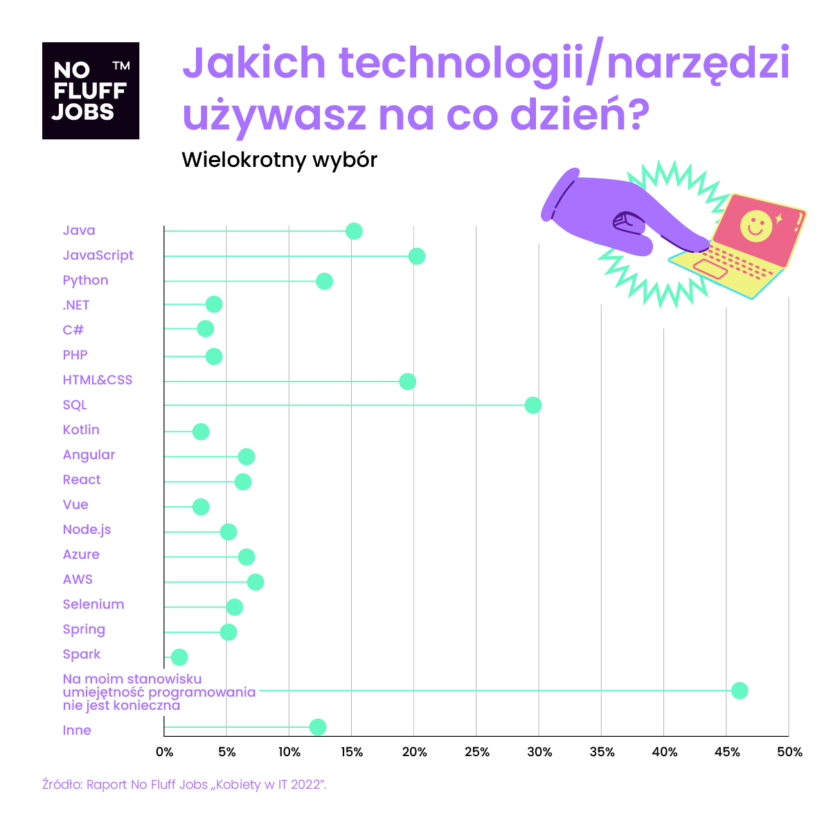Women in the IT sector are not only programmers. 46% of. hold other positions in the industry
No Fluff Jobs – a Polish portal with IT announcements – on the occasion of International Women’s Day, for the third time in a row, analyzed the situation of female IT specialists and job candidates in the industry. From the report “Women in IT 2022“The results of the survey show that ⅔ of female professionals have been working in the IT sector for less than 5 years, and already 46% of women in the IT sector have a job outside of programming. women hold positions not directly related to programming – most of them are testers and project managers. Interestingly, only 27.5 percent. of those surveyed have graduated from IT studies. The majority of respondents are people who have changed their career path (55%).). Among them, those who have previously graduated in the humanities or social sciences predominate.
The most tempting are salaries and opportunities for development. Soft skills as a ticket to a career in IT
What makes women want to work in IT? As the No Fluff Jobs survey showed, female IT candidates are mostly interested in opportunities to broaden their skills and develop in a specific area (71%).), but also about the salary (71% of female.). For many of them, however, entering the industry is difficult – this is the opinion of as many as 75% of those surveyed. of female candidates for IT jobs. 40 percent. of women indicate that they do not know where to start, a similar percentage is not able to find a job offer that suits them, and one in three respondents admit that they have problems with choosing the right specialization.
And in turn, what skill do female IT professionals already working in the industry find most useful in working in the industry? As it turns out, it is largely the ability to work in a group (as much as 92 percent. indications). The ability to solve problems, in turn, was indicated by 86% of. of the surveyed women, and analytical skills – 82%.
– Eurostat data for the years 2013-2019 show that Poland leads the European Union in terms of the number of female graduates in science (STEM) per one thousand inhabitants (there are over 320 thousand future female specialists aged 20-29). This is positive and encouraging data, but the IT world is open not only to women with technical education – says Magdalena Gawłowska-Bujok, co-founder and COO of No Fluff Jobs. – According to our survey, 46% of. Women working in the sector hold positions not directly related to programming, such as. project manager. This may be a motivation for women who would like to enter the IT industry, do not have specific education and do not necessarily want to program, but have developed soft skills. And these, as it turns out, are the most useful in the work in the industry according to female IT specialists.

Specializations and technologies popular among female IT professionals and candidates
Survey conducted by No Fluff Jobs shows that more than half of women working in IT are engaged in coding. And in this case, the largest percentage of them specialize in Backend (15 percent.), Frontend and Fullstack (5.4 percent.). Some respondents pointed to DevOps and Big Data – 4 percent each., as well as Security (2.8%), AI and Mobile – 2.4% and 2.6% respectively. When asked which technologies they work with on a daily basis, almost 30% indicated SQL, slightly more than 20% of women in the industry received a. JavaScript, 19.3 percent for HTML and CSS, and 15 percent for. on Java.
However, the majority of respondents in this question (46%) are women.) replied that the position they currently hold does not require programming skills. Among the most popular specializations in this case among women turned out to be Testing (18.6 percent.), Project Management (16%).), Business Analysis (11.1 percent.) and UX (9.3 percent.).
– All these data show how versatile Polish female IT specialists are and how wide is the spectrum of specializations that they represent – says Paulina Król, Head of People & Operations at No Fluff Jobs. – In the “female” IT there is no single dominant branch, which gives a good chance to get into the industry representatives of different professions. Looking at the picture from the perspective of the challenges faced by IT companies today, the emergence of more women in the industry may quickly help to close the current staffing gap and give a new perspective on recruitment processes.
No Fluff Jobs also decided to check which of the specializations in IT are most desirable among female candidates for work in this sector. The most commonly identified areas by women aspiring to work in the industry were: UX/UI (29.4 percent.), Testing (21.2 per cent.), Frontend (16.3 percent.), Project Management (14.7 percent) and Technology (14.7 percent).), Design (13.6 percent).) and Business Analysis (13%).).

Job satisfaction, promotion opportunities and pay rises according to female IT professionals
Polish female IT specialists praise work in the technology sector and recommend it to others. 68 percent. women in the industry have received a raise in 2021, and 3/4 indicate they have a chance for a promotion at their current company.
Working in IT brings satisfaction to the vast majority of female professionals participating in the survey. Almost 71 percent. of respondents indicated that they feel fulfilled at work. In addition 67 percent. The data shows how versatile Polish female IT specialists are,” says Paulina Król, Head of People.
The most important factors that shape a positive perception of the industry were cited by the IT professionals surveyed as opportunities for advancement (88.4 percent.), high salary (89.9 percent.) and the openness of companies to allow them to work remotely (77.7%), Design (13.6%) and the number of employees (13.6%).).
– The IT industry offers women great opportunities for growth, so it’s no surprise that they are increasingly willing to enter it. As our survey has shown, work in this sector brings IT specialists a lot of satisfaction, which is certainly influenced not only by contact with new technologies, but also issues such as the possibility of promotion to a higher position and acquiring new skills – says Magdalena Gawłowska-Bujok, co-founder and COO at No Fluff Jobs.
The survey was conducted from 1 January to 28 February 2022 on a sample of 959 respondents working in the IT sector and planning to work in the industry.
